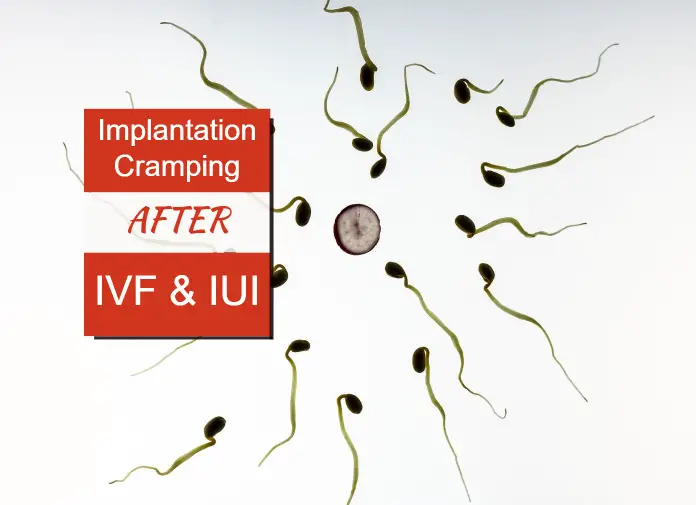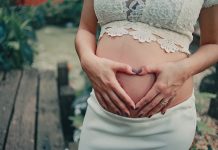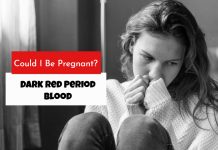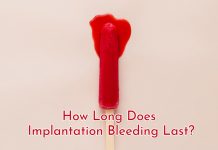Assisted reproductive technology (ART) is a lifesaver for an infertile woman. Once they conceive, do they face the same set of body changes like a woman with a normal conception does? Can you experience implantation cramping after IVF or IUI?
How far do these treatments interfere with normal pregnancy progression? Does IVF lead to implantation cramping that is worse than usual? These are the questions that keep coming in a woman’s mind when she is trying to decide whether she should undergo such a treatment.
IUI seems more natural as only sperm delivery needs assistance. Can IUI lead to normal fertilization?
Implantation cramping after IVF and IUI is normal like natural pregnancy implantation. These procedures only interfere in the preimplantation events.
Implantation occurs normally. In vitro fertilization ends up transferring the zygote that is forming an embryo inside the uterus.

What is implantation cramping?
Implantation cramps are because of egg embedding in the endometrial lining. The embryo keeps dividing and moving down the tubes. Later on, implantation occurs in the uterus. This is for the further growth and nourishment of the baby.
As the egg invades the lining of the uterus, it causes downward pull. The blood vessels crush to create space for the future embryo. This causes implantation cramping. They are mild and not painful like menstrual cramping. The duration of implantation cramping is less than a day.
Even in case of IVF and IUI implantation cramps don’t last for more than a day. Implantation cramps are signs that the embryo moved to the uterus. After implantation, you can take a pregnancy test 5 days later to get a positive pregnancy test.
What is IVF?
In Vitro Fertilization is the procedure of transferring embryo in the uterus. It is for women who cannot have normal fertilization. The reasons for using IVF are many including blocks in tubes or unsuccessful fertilization due to chemical reactions.
There are 5 steps for the complete IVF procedure.
- Fertility medications boost ovulation in women. They also raise hCG levels and thus give a false positive pregnancy test. The pregnancy test after IVF is therefore not accurate. After ovulation is normal and healthy ova start releasing from ovaries.
- The doctor retrieves these eggs and stores them in liquid nitrogen at a very low temperature.
- Then the male partner or a suitable donor produces a seminal fluid sample that has sperms. If the sperms are not capable of fertilization, then Intracytoplasmic injection completes the process.
- In an apparatus, the mixture of eggs and sperms is left for fertilization. After that, the zygote divides after thirty hours.
- The embryo is then placed in the uterus of the mother.
All this is parallel to the normal process of release of eggs as ovulation and then fertilization in the tubes. The zygote then divides and moves down in the uterus. Whether in this case or natural pregnancy now is the time for implantation.
If the process was successful, then you can expect implantation 6-12 days after egg retrieval. It is difficult to time implantation after embryo transfer because the time span is too small. Implantation cramps will occur after 6-12 days from egg retrieval.
Natural pregnancy also leads to implantation after 7-12 days from conception. The day of egg retrieval is like ovulation. And so implantation cramping after IVF happens 6-12 days later from egg retrieval.
Cramps immediately after the procedure of embryo transfer cannot be implantation cramping. This is because the embryo needs to acclimatize to the uterus and reach the right site. The catheter that doctors insert in your vagina will cause some discomfort. But if you have bleeding and pelvic pain after IVF, then you need to tell your doctor.
Fever and intense cramping after IVF are signs that something is wrong.
Implantation cramping after IVF
Implantation occurs within 24 hours aft r IVF. It is because the embryo is already placed next to the lining of the uterus. Now it has only to figure out the right place for implantation and using the trophoblast layer attach to it.
Implantation cramps begin 24-48 hours after IVF. In a healthy pregnancy, implantation happens 7-12 days after ovulation.
After the procedure of IVF, it is natural to feel some itching, very mild. The instruments inserted in the vagina are new to it. They may cause some discomfort and discharge. But it is not because of implantation.
Implantation is a 48 hours long process. And it takes time as the blastocyst gradually sinks in the endometrial lining.
What is IUI?
Intra Uterine Insemination is the procedure of delivering the sperms inside the uterus. In typical cases after sex, the sperms travel from the vagina to the fallopian tubes. There have to bear the hostile condition of the vagina. Out of a large number, only a few manage to reach the tubes which are the site for fertilization.
Why do you need IUI?
Men who have erectile dysfunction are not able to deliver the sperms deep in the vagina. The sperms need to have the motility, shape, and size for being able to travel in the vagina –> uterus –> tubes.
Capacitation is the process of making the sperms capable of traveling in the vagina. The contractions of the vagina and uterus are responsible for the movement of sperms. After that, the sperms move by themselves.
When a woman has scars and is not able to have normal fertilization then also she needs IUI. Sperms problems can be resolved by using IUI.
What happens during IUI?
During intrauterine insemination, the sperms are delivered inside the uterus using a catheter. After this, they travel normally inside the uterus to the tubes. The success rate is low compared to IVF, but it is less invasive and less expensive.
About 20% of women conceive after IUI’s first attempt. The male fluid from a suitable donor or male partner is first washed to remove the fluids. Then the doctor delivers the sperms directly in the uterus. IUI only interferes with the pre-fertilization steps or precisely sex.
After that, it is a normal pregnancy progression. Fertility drugs cause ovulation and IUI schedule is near to it.
After about 24 hours fertilization must occur. Later on, the egg starts dividing and moves down the tubes for implantation.
When do implantation cramps after IUI start?
Implantation cramps after IUI will occur as in case of normal conception. Implantation occurs after 6-12 days from IUI.
Note that during IVF you had to expect cramping 24 hours after the procedure. In the case of IUI, it is 6-12 days after the procedure. When you time the cramping from egg retrieval in case of IVF then even in that case you expect implantation cramps after 7-12 days.
Implantation cramps and bleeding after IUI
It is normal fertilization, and so you can expect normal implantation. Implantation cramps and bleeding after IUI occurs about six days after your procedure. This will only happen if fertilization occurs.
In the case of women who can’t provide the environment for fertilization, IUI will not succeed.
Cramps after IUI can be because your body is allergic to your partner’s fluid containing sperm. This will make your doctor think of other possible ways to treat infertility.
But the cramps that happen on the day of IUI or cramps after 24 hours from IUI cannot be implantation cramps.
It is not possible that within 24 hours fertilization also occurs and implantation cramping starts after IUI. The first division of egg after fertilization takes 30 hours. It is only when the zygote forms a 64 celled structure called blastocyst implantation begins.
How to stop implantation cramping after IVF and IUI?
If you want to relieve the cramping after IVF and IUI, then you need to ask your doctor. OTC painkillers can interfere with pregnancy. Only certain medications are permissible during pregnancy.
You can try home remedies for implantation cramps after IVF and IUI.
- Drink lukewarm water and lie down.
- Avoid sexual intercourse during implantation cramping.
- Do not wear tampons and do not douch.
- Eat fruits and raw veggies to have a healthy gut. Bloating can worsen the implantation cramping.
- Do not stress or physically strain your body during implantation cramping after IVF.




![Implantation Bleeding With Twins [How long does IB last with twins?] Implantation Bleeding With Twins](https://www.pregnanteve.com/wp-content/uploads/2019/01/implantation-bleeding-with-twins-218x150.jpg)




